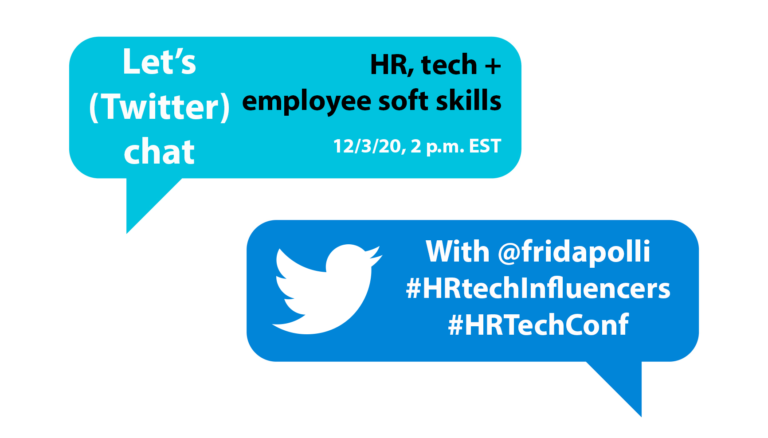The role of HR leaders has never been more important, as organizations struggle to keep up with near-daily changes to the world of work ushered in by the coronavirus pandemic and other global challenges. With such a tall order for HR leaders, it’s beneficial to look to industry experts for their experience and guidance. Earlier this year, HRE and the HR Tech Conference unveiled the second edition of the Top 100 HR Tech Influencers, comprised of HR, business and technology leaders whose insights are needed now more than ever.
Related: Q&A with HR Tech Influencer Lexy Martin
0 Influencer Frida Polli, Ph.D., is CEO and founder of pymetrics, an AI-based talent acquisition platform. Polli recently spoke with HRE about the pandemic’s impact on HR technology.
Influencer Frida Polli, Ph.D., is CEO and founder of pymetrics, an AI-based talent acquisition platform. Polli recently spoke with HRE about the pandemic’s impact on HR technology.
HRE: How can HR leaders best evaluate the rapid influx of post-pandemic tools flooding the market?
Polli: Fairness should always be a priority when it comes to evaluating technology. Efficiency does not need to come at the expense of equitability, especially not when the stakes are extraordinarily high for so many job seekers. Unbiased technology that satisfies both of these requirements exists, so there is no excuse to settle. The key is not to leap at every innovation offered in the market, but to thoughtfully figure out what will add to creating a simple and humane hiring experience.
Talent teams will also be remiss if they are not also considering the technology that can expand the visibility of the skills, capabilities and experience within their workforce. The value of internal talent supply to fill high-priority roles cannot be overstated. At the peak of COVID-19, for instance, overwhelmed hospitals had to rapidly redeploy segments of their workforce to mitigate the shortfall of staff in emergency departments. For the reasons that it is more cost-effective, drives better performance, and, bluntly put, is the right thing to do (as opposed to reactionary layoffs), demand for internal mobility will only accelerate from here on out. Tech stacks are not to be set and forgotten. The fact is, there is no better time than now to start diagnosing the gaps in your systems.
HRE: As the job market drastically changes, what types of tools will be most essential for recruiting and talent acquisition?
Polli: The last several months have undoubtedly upended long-held beliefs about how we work and the tools we need to do so. In most instances, it has accelerated longer-term trends—many are doing in three months what was predicted to take three years or even three decades. Whether or not an HR team chooses to adopt digital tools and processes historically has been optional, but in the era of COVID and remote working, there are certain tools that have become essential to the application process due to social distancing measures and other precautions.
Click here to register for free, virtual Spring HR Tech.
Technological tools can massively lift recruiters’ workloads by automating key stages of the hiring process. Chatbots can keep candidates engaged and informed by providing quick replies to FAQs and updates on application status. Video conferencing platforms, arguably the hottest tool in our socially distanced reality, minimize the chore of scheduling and reviewing interview responses. And digital assessments, which measure aptitudes ranging from technical competency to cultural fit, can help recruiters whittle applications down to a manageable number, while still considering their entire pipeline of talent. These tools (with the exception of digital interviewing) may continue to remain “nonessential” in the most literal sense, but most if not all organizations have recognized their immense value in not only running business-as-usual but also in pushing the needle and maintaining a competitive advantage.
 HRE: How can HR leaders—and HR tech buyers—continue to focus on and invest in areas like D&I with business priorities so suddenly shifted?
HRE: How can HR leaders—and HR tech buyers—continue to focus on and invest in areas like D&I with business priorities so suddenly shifted?
Polli: In the context of business priorities, terms like “equitable,” “diverse” and “human-centered” are often framed as idealistic. Put differently, while it might be “good” for companies to aspire to these norms, they are fairly easy to deprioritize when times get tough. Significant amplification of inequality can occur if our business strategies and solutions are not designed and deployed in a conscientious manner. The groups most affected by economic disruption are the most vulnerable in our society, and tools have the power to either alleviate their misfortunes or make them much worse. Disheartening research indicates that racial minorities are more likely to be laid off than their white peers. When these workers then try to find new employment opportunities, conventional hiring systems, like resumes and cognitive ability tests, also place them at a significant disadvantage in the process.
In continuing to navigate this period of uncertainty for our society and its aftermath, the fairness implications of any technological solution need to be considered carefully. Whether in AI or in other disciplines, ethics are not something that can be put on hold, and for those companies who have not yet put their principles into practice, now would be a good time to start.